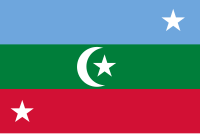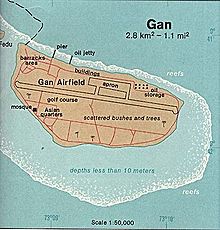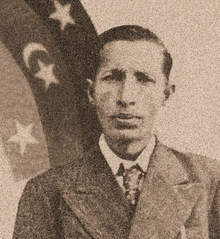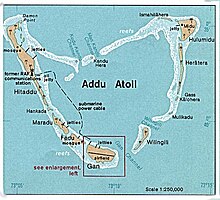Republic of Suvadiva
|
||
 Map of the Republic of Suvadiva; top left the national coat of arms |
||
| Political status | former de facto regime 1959–1963 | |
| Official language | Dhivehi | |
| Capital | Hithadhoo | |
| Head of state | Abdullah Afeef Didi | |
|
Independence from the Maldives |
January 3 / March 13, 1959 (unilateral declaration) |
|
| End of secession | 23 / thirtieth September 1963 | |
| population | approx. 15,000 - 20,000 | |
The Republic of the United Suvadiva Islands , dhivehi : އެކުވެރި ސުވައިދީބު ޖުމްހޫރިއްޔާ ( Ekuveri Suvaidib Jumhouriyya ), engl . United Suvadive (Islands) Republic , was a short-lived, separatist state in the south of the Maldives .
The internationally not recognized state existed from 1959 to 1963 . The reasons for the secession of the Republic of Suvadiva were trade restrictions as a result of the Maldivian government's efforts to centralize and a conflict over the British military base in Gan .
Name and territory
The republic comprised the three southernmost atolls of the Maldives , namely the Addu , Fuvahmulah and Huvadhu atolls .
The name of the state is derived from "Suvadiva" (Dhivehi: ސުވައިދީބު), an old name for the Huvadhu Atoll. All three southern atolls are therefore collectively referred to as Suvadiva-Achipel or Suvadives .
history
Historical background
Suvadiva's secession coincided with the independence movements of the South Asian states: the Republic of India gained independence in 1947, and Ceylon followed in 1948 . This also led to efforts for independence in the neighboring Maldives.
The Sultanate of the Maldives had been under British influence since the beginning of the 19th century, and in 1887 it was formally a protectorate within the Empire without the British interfering in internal affairs. During the Second World War , the Royal Navy established a base on the southernmost island of Gan in the Maldives . The residents were forcibly resettled for the construction , but the presence of the British provided trade opportunities and jobs, so that the southern islands soon had better living conditions than in the north. After a brief republican phase in 1953, Muhammad Fareed Didi was crowned sultan ; But from December 1957 the most active man in the state was its Prime Minister Ibrahim Nasir . In 1957 the Gan base, which had lost its military importance towards the end of the war and had been abandoned, was re-occupied by the Royal Air Force due to the Cold War .
Conflict between the government in Malé and the southern atolls
Between the Suvadiva Islands and the rest of the Maldives, there have always been differences in culture, mentality and dialect of the residents due to the great distances and the spatial separation through the One and Half Degree Channel . For centuries, the Maldivian sultans only had a loose supremacy over the Suvadives, which meant that the southern islands could develop relatively independently. Since the One and Half Degree Channel represented an important sea route for centuries, the Maldivians in the south were also used to visits from foreign seafarers and thus far more cosmopolitan than the population in the north.
Restriction of foreign trade
The first cause of the incipient conflict are the trade restrictions decided by the Maldivian government: the city of Malé was an important trading center for the northern and central Maldives ; from here merchant ships ran for Ceylon and India and brought foreign goods to the Maldives. The trade was carried out by a few influential merchant families who had a de facto monopoly on foreign trade. The situation was different in the south of the archipelago: Since the sea route to Malé was around 500 km and was difficult to navigate through reefs and shallows , it was easier and more financially worthwhile for the inhabitants of the southern atolls to take offshore sailing ships (called Vedi or Odi ) to trade directly with India, Aceh and especially Ceylon ( Colombo and Galle ). For a long time, the government had no way of taxing this trade, which bypassed the capital Malé, and of demanding customs duties . In the 1940s, however, the administration was modernized and the state centralized . In order to simplify and better control maritime trade, the Maldivian and British governments jointly decided in 1947 to introduce special passports and visas , without which international trade should no longer be possible in the future. Maldivian diplomats were stationed in Colombo to monitor compliance with the new law. The agreement was limited to British possessions, but since a similar procedure had been in place in the Dutch East Indies for a long time and India was becoming less important as a trade destination due to the unrest there, circumventing the law was practically impossible. Since the passports were only issued in Malé, the southern Maldivians could not avoid trading via the capital. The fact that the important merchants of Malé used their influence in the administration to disadvantage their competitors from the south in the issue of passports led to growing dissatisfaction in the Suvadives.
The lease for the Gan base
Another cause of the conflict is the British military base on Gan. The recruitment of the base, now known as RAF Gan , in 1957 was associated with unexpected problems for the British authorities. The UK government had prepared a lease that would have allowed the UK to use it for 100 years for a small fee. The treaty was signed, but the parliament of the Maldives (Majlis) rejected the treaty, which was perceived as unfair, and thus prevented ratification . Regardless of this, the expansion of the base continued; At the same time, the British promoted the autonomy of the inhabitants of the Addu Atoll and created a mood against the government in Malé in order to exert pressure on them.
The final break between Great Britain and Malé occurred in 1958: the new Prime Minister Ibrahim Nasir no longer wanted to continue the moderate policies of his predecessor and demanded - convinced that the British would not enforce their supremacy over the Maldives by force - the cessation of construction work and the Abandonment of the Gan base or at least a new lease with a shorter term and higher payments. The news that the Maldivian Prime Minister had called for the base to be closed led to protests against the government in the Addu Atoll, where the residents were leading a luxurious life by Maldivian standards due to the presence of the British. However, attacks against government officials were prevented by the British military police.
Prohibition of trade between locals and the British
During the Second World War, the Maldivian government banned all direct trade between the British and Suvadivers in the Addu Atoll. The ban even included the barter and sale of coconuts and fish. The locals were also banned from working for the British. The government's reasons for this step are not known; it was probably worried by the rapidly increasing prosperity in the south and feared the negative impact on residents. The prohibition law was controlled by militiamen from Malé stationed on Gan, who, however, soon made themselves unpopular due to their undiplomatic behavior. An angry crowd gathered after two militiamen beat up and arrested a son from an important Hithadoos family; the guards from Malé sought refuge with the British. After the situation had calmed down, government officials who had arrived from Malé and who only believed the unilateral statements of the militia officers had numerous insurgents flogged in public . Among those convicted was the respected intellectual Abdullah Afeef , who worked as a translator for the British .
Even after the base was reoccupied in 1957, the trade ban was initially upheld. It was only after some time that a new agreement was signed that allowed Maldivians to trade with the British and work on the base.
New taxes
Also in the course of centralization, the government's control over the islands was strengthened. For a long time, the southern atolls had only paid extremely irregular taxes. Thanks to the improved administration, the vaaru ( poll tax ) and the varuvaa ( property tax ) could now be collected on a regular basis .
Finally, on New Year's Eve 1958, the government announced a new tax on boats , which led to the outbreak of unrest.
Secession 1959–1963
Establishment of the new state
The announcement of the new tax on boats finally led to escalation: on the morning of January 1, 1959, a mob banded together, armed themselves with rifles and batons, and destroyed some government buildings. The government officials themselves were able to escape to the British, as they had been warned in good time by Abdullah Afeef, whom Prime Minister Nasir had previously appointed as liaison and mediator between the British and locals.
The Malé government accused Major Phillips , the British liaison officer on Gan, of instigating the uprising. This allegation is considered unlikely and there are no documents showing an active role of the British in the uprising. However, most of the British soldiers stationed showed open sympathy for the insurgents and did nothing to stop the riots, other than measures to avoid deaths, although they could easily have done so. A British soldier is even said to have distributed matches to set the fire . The uprising was also supported by the British company Costain Ltd , which was responsible for the expansion of the base and whose profit was jeopardized by the construction freeze called for by Nasir.
Since the insurgents awaited the death penalty for burning down government buildings , there was no turning back: On January 3, a delegation of residents of the Addu Atoll visited the Gan base and declared their independence from the Maldivian government in the presence of the British. Although a permanent independence of the Suvadives or their recognition under international law was excluded from the outset, the British promised vague support, but demanded a trustworthy contact person. Abdullah Afeef was pushed into this position: he was educated and respected throughout Addu, was friends with Major Phillips and was officially appointed mediator by Ibrahim Nasir. He refused, however, as he considered the rebellion to be hopeless from the start and feared acts of revenge against his family. Only after he had been massively harassed by various leaders of the insurgents and he had been assured in writing by the British that he would be evacuated in the event of failure, he complied and was appointed head of state.
In the next few weeks the construction of the new state began: elections were prepared, own passports were issued and banks and trading bases were established. On March 13, 1959, the two more northerly atolls Fuvammulah and Huvadhu also split off from the Maldivian Sultanate and joined Addu; the Republic of the United Suvadiva Islands was established.
Government response
Prime Minister Ibrahim Nasir reacted with military countermeasures against the secession: He portrayed the Republic of Suvadiva as a Christian-influenced British puppet state and linked to the national hero Sultan Mohamed Thakurufaan , who had expelled the Portuguese centuries earlier. In this way he drew the support of the rest of the Maldivian population on his side. In July 1959 a gunboat (a sailboat ) led by him personally reached the Huvadhu Atoll. Since Abdullah Afeef had not managed to set up his own army , there was no organized resistance, and Huvadhu was quickly retaken. The Maldivian soldiers failed to land on Fuvammulah, they opened fire on locals on the beach, who threw stones at them. The Addu Atoll was spared a Maldivian attempt at reconquest, as the British had relocated a regiment from Malaya to Gan and thus deterred Nasir from attempting an invasion.
Finally the parliamentary elections of the Republic of Suvadiva took place; due to the military situation, voting was only possible in the Addu Atoll. These were the only elections in the Republic of Suvadiva and the first free democratic elections in the Maldives. The elected parliament consisted of 52 MPs (17 from Hithadhoo , 7 from Meedhoo , 8 from Hulhudhoo , 10 from Gan-Feydhoo , 3 from Maradhoo-Feydhoo , 6 from Maradhoo and one person appointed by President Abdullah Afeef).
In 1961 another uprising broke out in Huvadhu Atoll; the population demanded a return to the Republic of Suvadiva. Ibrahim Nasir led another invasion, but this time the rebellion was suppressed far more bloodily. On the island of Havaruthinadoo (Thinadhoo) , the traditional seat of the leader of the atoll and stronghold of the uprising, Nasir set an example: the inhabitants were driven into shallow water, then the village was looted and burned down. Allegedly there was murder and rape. Numerous residents were deported to prison camps in the north, where many perished. As a result, the Huvadhu (Gaafu) administrative area was divided into two separate areas ( Gaafu Alif and Gaafu Dhaalu ) for better control .
End of independence
With the violent suppression of the uprising in the Huvadhu Atoll, the inferiority of the Republic of Suvadiva against Ibrahim Nasir's troops became clear. The republic also came under political pressure: the British government had meanwhile reached an agreement with Nasir on the Gan base; a new agreement has been signed. With this, Suvadiva had lost its political usefulness for the United Kingdom, which led to the suspension of support. The British diplomat Arthington Davy demanded before the Suvadivian parliament the recognition of the supremacy of the Maldivian sultan and the reconnection to the sultanate, which was however rejected outraged by a large majority, whereupon Davy said that the MPs should be beaten with a stick until they did Understood the principle. Finally, on September 22, 1963, a British ultimatum called for the Suvadivian flag to be lowered and the Maldivian flag to be raised. At the same time it was announced that in future only subjects of the Sultan would be allowed to work in the factories on the Gan base. The next day, September 23, the request was complied with and the Maldivian flag was hoisted on Maradhoo Island , and seven days later, on September 30, also on Hithadhoo . On the same day, President Abdullah Afeef Didi left the atoll on the ship HMS Loch Lomond and went into exile in the Seychelles .
consequences
Sultan Muhammad Fareed Didi announced a general amnesty so that there were no punitive measures against the insurgents. A few years later, Nasir allowed Abdullah Afeef to visit his family members who had stayed in the Maldives, but he was not allowed to return permanently. He died in the Seychelles in 1993.
The British, whose reputation in the Maldives had been damaged for a long time, stayed on Gan for another 13 years before the base - replaced by Diego Garcia - was closed in 1976.
In 1965 the Maldives finally gained independence. Prime Minister Ibrahim Nasir had asserted himself as a "strong man" by suppressing the rebellion; After the abolition of the monarchy in 1968, he became president and, as an important reformer, ruled the Republic of Maldives autocratically until 1978 .
After the economic situation in the south had worsened after the abandonment of the Gan base and the tourism that began at the same time concentrated on the region around Malé, the republic of Suvadiva was strongly [glorified] by the inhabitants of the Addu Atoll. In contrast, Suvadiva is a symbol of British colonialism in the rest of the Maldives .
literature
- Hellmuth Hecker : The Republic in the Indian Ocean, constitutional development and legal status of the Maldives.



